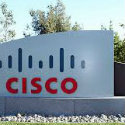Cisco wades into private 5G market
Cisco is selling private 5G to enterprises under a 'as-a-service' model, allowing enterprises that purchase the offering to pay for it only as they use it.

Cisco on Thursday announced its intention to sell a private 5G offering to enterprises. The company promised to show off the new product at the upcoming MWC trade show in Barcelona, Spain.
The company also announced new Wi-Fi and switching products for enterprise customers alongside the private 5G offering.
Figure 1:  Cisco's new private 5G offering will run over midband spectrum.
Cisco's new private 5G offering will run over midband spectrum.
(Source: Cisco)
In developing a private 5G product, Cisco is entering a crowded market. Mobile network operators like AT&T and Verizon offer private 5G networks, as do cloud computing companies like Google and Amazon, startups like Betacom and Celona, and mobile network equipment suppliers like Ericsson and Nokia.
Indeed, Amazon's recent introduction of its own private 5G offering sparked plenty of debate about whether the strategy represents a threat to established mobile network operators like Verizon and AT&T. "It's possible," acknowledged AT&T CEO John Stankey.
Cisco says its offer won't compete with telcos' private 5G
Cisco is arguing that its entry into the space won't impact established mobile network operators. In response to questions from Light Reading, the company said it is working with service providers to sell the new private 5G offering through their sales channels. Cisco added that service providers can sell their private 5G offering as a white label solution.
"The white label model makes sense. It allows operators to extend their reach and benefit from Cisco's enterprise footprint," said Gabriel Brown, a principal analyst with Heavy Reading (a sister company to Light Reading).
Cisco is selling the offering under an "as-a-service" model, meaning that enterprise customers who purchase it will only pay as they use it. The company said that it would team up with unnamed partners for all the necessary components, adding that it will run over midband spectrum. The company did not provide any further details.
Cisco's support for the midband spectrum is noteworthy considering that many private wireless offerings in the US market run on a 3.5GHz midband CBRS spectrum. That band is available on both a licensed and unlicensed basis.
However, the market for private wireless networking in the CBRS band isn't living up to some expectations, according to one analyst firm.
Dell'Oro Group lowered its sales expectations for CBRS-capable radio access network (RAN) equipment. The company previously expected the market to rise from 2% of the overall RAN market in 2021 to 5% by 2026. However, the firm now believes that CBRS RAN revenues will account for less than 5% of overall North America RAN revenues by 2026.
According to Dell'Oro's Stefan Pongratz, one major drag on the CBRS market is in the private wireless networking space. He said sales in that sector have been slower than expected.
"It's still early days," he said of private wireless networking in the CBRS band.
Related posts:
— Mike Dano, Editorial Director, 5G & Mobile Strategies, Light Reading | @mikeddano
About the Author(s)
You May Also Like



.jpg?width=300&auto=webp&quality=80&disable=upscale)








